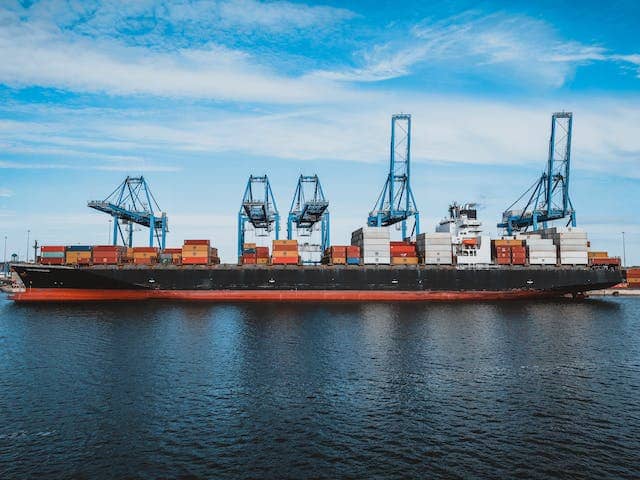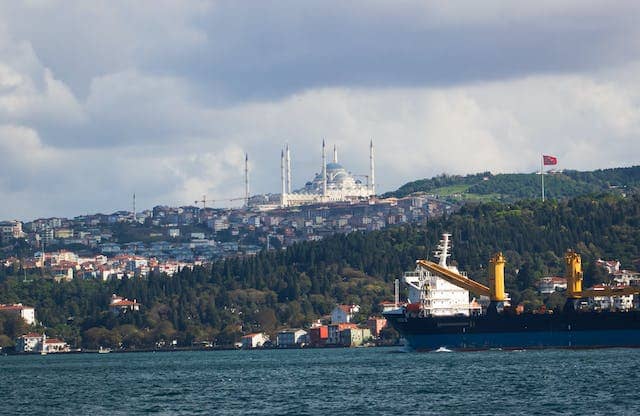Shipping from China to Turkey encompasses a complex logistics network that connects two dynamic economies.
As an eCommerce business, understanding the intricacies of this trade route is crucial for maintaining supply chain efficiency and competitive edge.
The symbiotic relationship between China’s vast manufacturing base and Turkey’s strategic position as a gateway to Europe creates a vibrant trade corridor.
Navigating the shipping process effectively ensures that your products move swiftly from production to market, minimizing costs and transit times.
Selecting the right shipping methods and understanding the associated costs and customs regulations are pivotal for smooth international trade.
Whether employing sea freight, air freight, or rail, grasping the nuances of global shipping and logistics management is essential.
By focusing on these aspects, your business can benefit from the current shipping industry trends and leverage them for commercial success.
Market Insights: China to Turkey Trade Dynamics
The economic relationship between China and Turkey is a vibrant component of international trade. It impacts your shipping decisions significantly.
When you’re planning to ship from China to Turkey, understanding the trade dynamics can help you make informed choices.
Economic Partnership
China and Turkey have fostered a strong economic partnership over the years. This connection is partly due to Turkey’s strategic location, bridging Asia and Europe.
The ability to serve the European market through Turkey is a considerable advantage for Chinese exports, as reflected in the efficient freight shipping options available for your business needs.
Trade Volumes
The volume of goods moving between the two countries has grown substantially, with over 41 billion USD worth of goods shipped from China to Turkey in 2022 alone.
This growth suggests that there’s a robust and expanding market for goods moving in both directions.

Trade Facilitation
Both countries participate in initiatives to streamline trade, such as the Belt and Road Initiative (BRI).
Integrating Turkey’s Middle Corridor vision into the BRI enhances connectivity and facilitates smoother trade flows.
This means you can expect a smoother shipping process due to the improved trade infrastructure.
Incorporating these insights into your shipping strategy will give you an edge in navigating the complexities of international logistics and keep your business moving forward efficiently.
Overview of Shipping Methods
When you’re looking to ship goods from China to Turkey, you have several options, each with its distinct advantages and challenges. Let’s break them down:
Maritime Transport
Sea Freight: This is the most commonly used method for its cost-effectiveness and ability to handle large volumes. Container shipping falls under this category and is ideal if you’re not in a rush, providing reliable logistics solutions.
- Pros:
- Cost-efficient for bulk goods
- Suitable for heavy or large items
- Fewer restrictions on item types
- Cons:
- Longer transit time
- Susceptible to weather-related delays
Air Freight
Air Transport: If speed is of the essence, air freight will get your goods to Turkey much faster than maritime options.
- Pros:
- Fastest shipping method
- Highly reliable departure and arrival schedules
- Tighter security for your goods
- Cons:
- Significantly more expensive
- Limited by weight and size of cargo
- Less environmentally friendly
Rail Transport
Railway Freight: A newer player in the shipping game, the railway is a middle-ground option, offering speed similar to air freight but at a lower cost.
- Pros:
- Faster than sea transport, yet more cost-effective than air
- Capable of carrying substantial volumes
- More energy-efficient than air freight
- Cons:
- Possible delays due to transnational rail traffic
- Limited network compared to sea routes
- Affected by geopolitical situations
Key Shipping Routes and Major Ports

When planning your shipment from China to Turkey, you need to consider the most efficient and cost-effective routes and ports to use. The choices you make will affect your supply chain optimization and logistics management.
Major Shipping Routes
The primary shipping routes between China and Turkey encompass both maritime commerce and air transport. Each offers distinct advantages depending on your cargo’s type, urgency, and volume.
Sea Routes: The predominant route for sea freight usually begins at Chinese ports and passes through the Suez Canal before reaching Turkish ports. It’s recognized for its cost efficiency and ability to handle large volumes.
Air Routes: For more urgent or high-value shipments, the air route from major Chinese airports to Turkish airports offers a much faster, though pricier, alternative.
Top-Rated China Freight Forwarder
Expert Shipping Solutions for Your Needs
Major Ports in China and Turkey
The right ports are crucial for an effective transport infrastructure and seamless cargo handling. Here are the vital hubs in China and Turkey facilitating trade routes between the two nations.
In China:
- Shanghai: The world’s busiest container port, optimal for eastern and central China.
- Shenzhen: Near Hong Kong, beneficial for southern China.
- Ningbo-Zhoushan: Close to Shanghai, serving the Yangtze River Delta.
- Guangzhou: Covers the Pearl River Delta.
- Qingdao: Serves the eastern coastline, near Korea and Japan.
In Turkey:
- Istanbul Ports: Key entry points due to proximity to Europe.
- Port of Gemlik: Near the industrial heartland in the Marmara Region.
- Port of Mersin: The largest port in Turkey’s Mediterranean, connecting to the Middle East.
| Country | Port Name | Location Advantage |
| China | Shanghai | Access to the Yangtze River Delta |
| China | Shenzhen | Proximity to Hong Kong |
| China | Ningbo-Zhoushan | Near Shanghai |
| Turkey | Istanbul | Gateway to Europe |
| Turkey | Gemlik | Near Marmara Region |
| Turkey | Mersin | Mediterranean access, Middle East Trade |
Choose wisely considering your needs for reaching various inland destinations while optimizing your logistical strategies.
Cost Factors in Shipping from China to Turkey

When considering shipping from China to Turkey, it’s crucial to understand the elements that can affect your total shipping costs. These factors can significantly impact the efficiency of your supply chain and the total expenditure of your logistics management.
Factors Influencing Shipping Costs from China to Turkey
Freight Forwarding Services
Choosing a reliable logistics company is essential. They provide expertise in freight forwarding, which can streamline the cargo transit process and affect the overall cost.
Service Selection
Your choice between air freight, sea freight, or road freight has varying cost implications. Air freight is faster but typically more expensive, while sea freight is more cost-effective for heavier shipments.
Weight and Volume
Carriers charge based on the actual or volumetric weight of the cargo, whichever is higher. Optimizing packaging to minimize unnecessary space can reduce costs.
Incoterms
The shipping terms agreed upon in your contract (like FOB, CIF, DDP) define who pays for which shipment stages and can influence costs.
Customs Duties and Taxes
Vary according to the type and value of goods shipped. Understanding the customs clearance process and applicable duties helps prevent unexpected fees.
Insurance
Protecting your shipment against loss or damage can add costs, but it secures the value of your cargo.
Seasonal Fluctuations
The demand for shipping services varies throughout the year, influencing price.
Logistics Solutions
Efficiency within the supply chain, including warehousing and distribution services, can affect the total shipping cost.
Pricing Estimates
It’s essential to have a clear idea of potential shipping costs. Here’s a breakdown of general pricing estimates for various shipping methods:
| Shipping Method | Estimated Cost Range |
| Air Express | $5 – $9 per kg |
| Air Freight | $4 – $8 per kg |
| LCL (Less than Container Load) | $50 per kg |
| FCL (Full Container Load) 20’ | $1,500 – $2,000 per container |
| FCL (Full Container Load) 40’ | $3,000 – $4,000 per container |
Note that these estimates are general and can vary based on the specific factors outlined above. To plan your budget effectively, seek a detailed quote tailored to your shipment’s unique specifications.
Transit Times and Efficiency

When considering shipping from China to Turkey, it’s crucial to understand the transit times for various methods, which can impact your supply chain optimization.
Air Freight
For urgent deliveries, air freight shines with its speed. Your goods can typically arrive in Turkey within about 5 to 7 days. Despite higher costs, the fast transit time may justify the spend for items needing swift transport.
Sea Freight & Container Shipping
Sea freight, on the other hand, offers a more cost-effective but slower solution, with the journey usually taking 35 to 45 days.
With this option, you’re looking at container shipping, which includes Full Container Load (FCL) or Less than Container Load (LCL).
FCL secures an entire container for your goods, suitable for high-volume shipments. LCL consolidates shipments from various shippers into one container — a smart pick if you’re sending smaller quantities.
Here’s a quick reference to gauge the average shipping durations:
| Shipping Method | Transit Time |
| Air Freight | 5 – 7 days |
| Sea Freight (FCL/LCL) | 35 – 45 days |
The choice between these options hinges on your priorities. If delivery speed is a driver, air freight will be your ally. For larger shipments where cost-efficiency takes precedence, sea freight’s slower pace could very much be worth the wait.
Customs Clearance and Regulatory Compliance
When shipping from China to Turkey, businesses must navigate the customs clearance process efficiently and fully comply with all regulatory requirements.
Understanding the complexities of international logistics and adhering to proper protocols can save time and avoid costly delays.
When your shipments arrive in Turkey, they must pass through customs clearance before entering the country.
This process involves assessing and paying duties and taxes, as well as a thorough inspection of cargo to ensure it meets Turkish import-export regulations.

Freight forwarders can help you handle these procedures due to their experience and established presence in both Chinese and Turkish ports.
To ease the process, ensure that all your goods are properly labeled, packed, and accompanied by a detailed inventory. Turkish customs authorities are vigilant about security and compliance, so accurately declared shipments help prevent unnecessary hold-ups.
Required Documentation and Compliance
For a smooth shipment from China to Turkey, you’ll need the following documents:
- Commercial invoice: This should detail the value and description of your goods.
- Bill of lading (BOL) or Air Waybill (AWB): The BOL for sea freight or AWB for air freight acts as a receipt and contract between you and the carrier.
- Certificate of Origin: This certifies where your goods were manufactured and affects duty rates.
- Packing list: It must match the contents of your shipment exactly.
- Import license: If your goods require it, this must be presented to Turkish customs.
It’s also crucial to comply with Turkey’s specific import-export regulations, involving product standards, safety, and other legal stipulations.
The trade facilitation services provided by freight forwarders can advise on achieving compliance, thus ensuring uninterrupted logistics movement.
By following these guidelines and leveraging the expertise of seasoned freight forwarders, you can effectively manage the customs clearance and regulatory compliance aspects of your international shipping endeavors from China to Turkey.
How to Choose a Reliable Freight Forwarder
When shipping goods from China to Turkey, your choice of freight forwarder is critical for a smooth logistics experience. Here’s how you can find a trustworthy partner that fits your needs:
1. Research Experience.
Look for forwarders with a track record in China-Turkey shipping routes. Their familiarity with both countries’ customs regulations and logistics environments is invaluable.
2. Check Their Services.
Ensure the forwarder provides comprehensive logistics solutions, including warehousing, handling, and last-mile delivery. Integrated services can streamline your shipping process.

3. Assess Credibility.
Check for accreditations like FIATA or logistics association membership, which signal professionalism and reliability.
4. Get Quotes.
Contact multiple forwarders to compare prices. Don’t just go for the cheapest; balance cost with the services and reliability offered.
5. Evaluate Communication.
Choose a forwarder that communicates clearly and promptly. A responsive forwarder can help you navigate unexpected issues efficiently.
6. Read Reviews.
What are others saying? Look at customer feedback and case studies. Peer experiences can indicate the forwarder’s ability to handle your shipments.
Best Practices for Shipping from China to Turkey
1. Choose the Right Freight Option.
You have multiple freight options when shipping from China to Turkey, including air, sea, and road freight. For maritime transport, which is typically favored for its cost-effectiveness, ensure your choice aligns with your budget and timeline.
2. Understand the Customs Regulations.
It’s essential to familiarize yourself with the customs regulations of both China and Turkey. Ensure all your paperwork is in order to prevent delays. This includes invoices, packing lists, and any required export-import documentation.
3. Pack Your Goods Properly.
Adequately packaging your goods can prevent damage during transit. It’s especially crucial for sea freight, as maritime conditions can be unpredictable.
4. Plan for Supply Chain Efficiency.
Streamline your supply chain by coordinating effectively between suppliers, logistics providers, and local distributors in Turkey. This boosts efficiency and can significantly cut down transit times.
5. Consult with a Local Expert.
Navigating the complexities of international shipping can be challenging. Consider partnering with a logistics expert with experience in shipping from China to Turkey. They can provide valuable insights into improving your supply chain management.
6. Keep Track of Your Shipment.
Utilize tracking services offered by your logistics provider to stay updated on your shipment’s status. This can help you manage your expectations and plan accordingly.
7. Be Prepared for Transit Time Variability.
Remember that transit times can vary due to factors such as weather, port delays, or customs clearance. Plan for these contingencies to minimize disruptions to your business.
Top-Rated China Freight Forwarder
Expert Shipping Solutions for Your Needs

FAQs about Shipping from China to Turkey
When shipping from China to Turkey, various queries may arise regarding parcel tracking, import taxes, shipping schedules, and prohibited items. This section addresses those common concerns to ensure a smooth shipping experience for you.
How Can I Track My Parcel or Shipment from China to Turkey?
To track your shipment, you will typically receive a tracking number from your freight forwarder or courier service.
Enter this number on the company’s tracking website to get current updates on your shipment’s location and estimated arrival time.
Some freight service providers offer detailed tracking systems for convenience.
What Is the Import Tax in Turkey?
Your imports are subject to taxation as per Turkish customs law. The import tax rate can vary based on the type of goods you’re shipping.
You’ll need to check with the Turkish customs authority or your freight forwarder for the specific tax rates applicable to your goods, as they can provide guidance on shipping strategy and customs procedures.
How Regularly Do Container Ships Travel between China and Turkey?
Container ships from China to Turkey depart every 2-4 weeks. The quickest sea freight route might take about 27 days, departing from Da Chan Bay to arrive in Ambarli.
Shipping schedules can be found on the websites of shipping service providers who list alternative ports and frequencies.
What Are the Prohibited Items When Shipping from China to Turkey?
When shipping to Turkey, certain items are prohibited, such as narcotics, weapons, ammunition, and materials deemed offensive by the Turkish government.
It is crucial to consult with your shipping agent or check the latest customs regulations for a detailed list of non-allowable items to avoid complications during customs clearance.
Streamlining Your Shipping Process from China to Turkey with Niche
When shipping your products from China to Turkey, supply chain optimization is crucial to ensure timely and cost-effective delivery. Enhancing each stage of your cargo’s journey significantly reduces delays and overhead costs.
Key aspects of a streamlined shipping process include:
- Accurate documentation to avoid customs clearance issues.
- Shipment tracking systems for real-time cargo location updates.
It’s essential to have a reliable partner who can provide a quick quote to simplify these steps, which in turn can assist with making informed decisions.
Remember to consider the following to optimize your shipments:
- Compare different freight options such as air, sea, and rail.
- Factor in the balance between cost and delivery speed.
- Ensure proper packaging to protect your goods during transit.
To effectively manage your supply chain, adopt strategies that align with your business needs and customer demands. Regularly evaluate your shipping methods to stay ahead of any potential challenges.
For peace of mind and a smoother transition of your goods to Turkey, request a sourcing quote from us at NicheSources. We will help you navigate the complexities of international shipping and set you up for success in your cross-border trade endeavors.
Additionally, our freight forwarding services offer comprehensive support throughout the entire shipping process. From pickup at the supplier to final delivery in Turkey, we ensure your cargo is handled efficiently and professionally. To get started with a tailored logistics solution, request a freight forwarding quote today.

